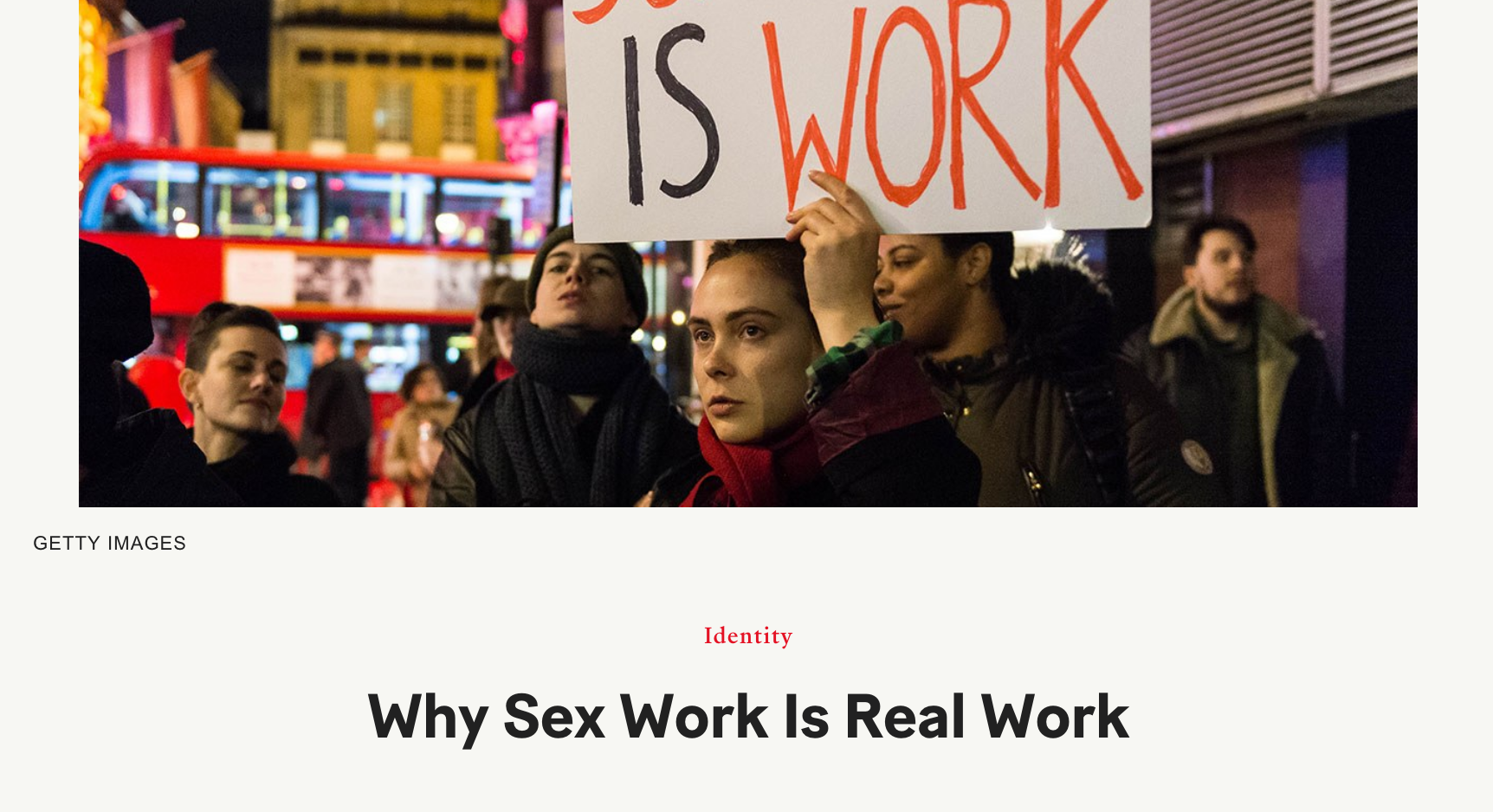Not many people are as unfathomably wealthy as Jeffrey Epstein was. But, in a gut-wrenching tragedy of twisted logic, there is an increasing amount of advocacy in favor of allowing people to buy sex like Jeffrey Epstein did–because, according to Teen Vogue (among others), “sex work is real work.”
Even as public awareness and pressure were mounting in the lead up to the arrest of billionaire Jeffrey Epstein for paying teenage girls for sex–alternatively and correctly known as his sexually trafficking and raping of minors–Teen Vogue was preaching (read: selling) to teenage girls the legitimacy of being paid for sex.
Yes, even as the culture bellows with rage over the sordid details of a wealthy old man paying girls fresh out of middle school for sex, the culture is also attempting to quietly convince these same minors–these teen-aged children–that being paid for sex is somehow empowering. A form of feminism. Social justice, even.
One would like to think that illogic of that magnitude would be glaringly self-evident. But one would be wrong.

Arguments for full decriminalization claim that legitimizing the process of being paid for sex (also known as the full legalization of prostitution) will somehow reinstate basic human rights to individuals who are paid for their “sexual services,” a claim that fails to hold any weight in light of the fact that prostitution cannot be “fixed.”
The 800-pound gorilla in the room that advocates for fully decriminalizing prostitution fail to reckon with is this: legalizing prostitution–a.k.a. calling “sex work” real work–does not actually respect human rights nor does it reinvigorate the true autonomy and dignity of those who trade sex for money.
In a gut-wrenching tragedy of twisted logic, there is an increasing amount of advocacy in favor of allowing people to buy sex like Jeffrey Epstein–because, according to Teen Vogue (among others), 'sex work is real work.' #SexWorkIsNeither Share on XProstitution cannot be “fixed” because in most cases it causes psychological and emotional trauma to those involved–no matter what the “protections.” The solution is to shrink this harmful industry, and yet legalizing does the opposite: it grows the sex trade by unleashing market forces and opening it up to big corporations.
That’s why it’s so important that we challenge the untruth which claims that “sex work” is real work and that, accordingly, we oppose a solution that would fully decriminalize prostitution.
The Case Against “Sex Work is Real Work”
One of the main points at the heart of the debate about the full decriminalization of prostitution (by this we mean the removal of all laws and any regulations around prostitution, the removal of which infer a right for persons to barter and trade other persons for sexual consumption in brothels, strip and night clubs, street corners) is what one believes about work.
While there are several meanings ascribed to the term, for the purpose of this discussion work should be understood as the labor, task, or duty that is one’s means of livelihood. For most people work is a necessary part of ensuring one’s survival: we work as the means to earn our wages and to sustain ourselves and those we love. For some, work may be a drudgery, a toil to be endured; for others, it may be a passion—a lifelong pursuit of one’s deepest interests and aspirations. From banking, engineering, janitorial service, the insurance industry, food service, education, medical professions, agriculture, journalism, law enforcement, aviation, to horticulture and beyond, there are a myriad of occupations in which one may work.
But this work is typically pursued within parameters. As a society we recognize that work should be performed within certain boundaries, and thus create rules concerning how it is carried out, such as the number of hours and days per week one must work, the number of sick days granted, and the minimum wages one can be paid. We also define certain conditions in which the work must be carried out—for instance mitigating the risk of injuries due to environmental hazards, and prohibiting certain activities such as smoking or drug use in the workplace, as well as racial discrimination and sexual harassment.
Prostitution cannot be 'fixed' because in most cases it causes psychological and emotional trauma to those involved–no matter what the 'protections.' #SexWorkIsNeither Share on XIt hasn’t always been this way. Current labor conditions in the United States are the result of generations of reforms (and even a civil war which resulted in a constitutional prohibition of slavery). And, while the current American labor context is no panacea, in many parts of the world others dream of working under the rights and protections ascribed to American workers.
But whether one lives and works in the United States, Germany, the United Kingdom, Japan, or Brazil, or Italy, Syria, Nigeria, Sierra Leone, Thailand, or anywhere else on the planet, what does it mean if one’s livelihood by means of prostitution is a normalized form of work?
It means that your daily existence will likely entail:
- routine verbal degradation;
- threat of physical assault and a wide array of physical injury;
- extreme risk of sexual assault and rape;
- being groped, pinched, licked, bitten and breathed upon by people who pay to use you;
- serial utilization of one’s orifices as a receptacle for male genitalia and other objects;
- likely acquisition of alcohol and/or drug addiction;
- likely acquisition of post-traumatic stress disorder;
- likely acquisition of any number of (potentially incurable) STDs; and
- possible premature death as the result of homicide.
In practical terms, it also means that while you experience these abuses and injuries:
- others will have a “right” to profit from the sale of your body;
- others will have a “right” to sexually access your body as long as they paid to do so (and even if they don’t);
- sexual harassment, assault, and rape are on-the-job requirements;
- law enforcement will look the other way, as no “crimes” have been committed;
- the public will at best turn a blind eye to your plight, or at worst mock your abuse by calling it “your job.”
Thus, experiences that the rest of the world’s workers are protected from–or, at a minimum, most rational members of society believe they should be protected from–comprise the core duties and conditions of “employment” for those in prostitution. Some “job.”
At NCOSE we recognize that the overwhelming majority of persons in prostitution around the world have turned to prostitution not because it’s a fantastic experience and they love the “benefits,” but because they were groomed for it, sold into it, can’t escape it, and/or have no other means to support themselves.
But whatever the circumstances by which they became entangled in the sex trade, we believe people deserve better than prostitution. We believe sexual exploitation is nobody’s “job.”
Especially not minors.
The Reason We Cannot Afford for Children to Be Taught that “Sex Work is Real Work”

If we silently (or not so silently) approve of our teenagers being told that “sex work” is real work, then perhaps we silently (or not so silently) communicate to our teenagers that maybe the crimes of Jeffrey Epstein really weren’t that heinous after all. That maybe the laws are disordered. That maybe these “enterprising” minors were just taking advantage of another market force of capitalism. That maybe this adult man was using his money to financially “empower” teen girls while procuring some stimulating company for his lonely self.
Before you dismiss all of that as mere hyperbole, remember that a magazine made for minors–female teen-aged children, specifically–legitimized and touted the importance of legalizing the exchange of money for sex to their audience of minors at the very same time that the rest of us were being deeply disquieted by the details of a man exchanging money for sex with dozens and possibly hundreds of minors.
Is that the truth we believe in and want our children to take hold of? No? Then we must not stand for anyone shilling it to them in any form or under any guise or according to any pretense.


